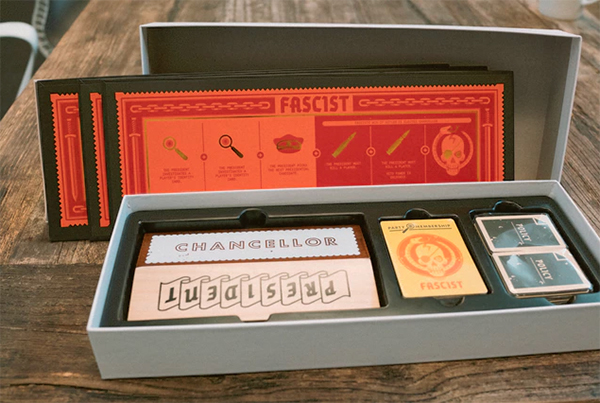Max Temkin knows his games tend to start a trend or catch a wave. Humans vs. Zombies rode the zombie craze, he says, and Cards Against Humanity (the raunchy party game that he’s most famous for) was part of the tabletop comedy game fad.
But when he and two others launched Secret Hitler, they didn’t know how much it would resonate for many people watching the 2016 election.
“I kind of wish that it wasn’t so on-the-nose,” says Tommy Maranges, who co-created the game along with Mike Boxlieter and Temkin.
As the trio developed and play-tested Secret Hitler, the news was full of headlines about Donald Trump upending poll after poll in the caucuses. To the game’s creators, his rise seemed uncomfortably reminiscent of both the game’s mechanics and its pre-war German setting.

In fact, when some Kickstarter backers voiced objections to the use of Hitler’s name (“I feel like we were tasteful with it,” says Temkin, “but fair enough”) and the gamemakers decided to include a set of stickers to “re-theme” their games, the most popular set was Secret Trump. (You can also get Secret Santa or Secret Dictator.)
“Maybe I shouldn’t be surprised, but there was way less objection to Trump than to Hitler,” says Maranges.
Secret Hitler, which launched on Kickstarter last November, is a hidden-identity game in the spirit of classics like Werewolf and Mafia, as well as The Resistance: Avalon, Don Eskridge’s grown-up spin on the genre. Games were shipped to Kickstarter backers last week, with a wider release coming in September—for now, it’s available in a free print-and-play format online.
The game’s mechanics are centered on hidden threats: Each player has a secret identity (fascist, liberal, or the Fuhrer himself) and a secret mission (either to elect Hitler or to assassinate him, depending on your identity). On the surface, everyone is on the same team, but each person’s true allegiance informs every action.
“The game is a collective decision-making dilemma,” says Temkin. “In a democracy, even when we disagree, we have to work together in good faith to solve a problem.”
But good faith does not, it turns out, make for good gameplay. That’s why the fascists, disguised amongst their liberal counterparts, constantly sow distrust. They can undermine the system in a variety of ways—even, in some situations, rigging elections in their favor. Hitler, meanwhile, does not always know who his allies are. “He’s actually probably the weakest player in the game,” says Maranges, but he’s easily buoyed to power by his supporters.
As for the real-life parallels, the gamemakers haven’t been quiet about their political leanings.
“A lot of people asked if we considered making Secret Hillary as well—no, not really. The parallels just aren’t there,” Maranges says. The decision isn’t likely to alienate their fans. Nine months ago, someone started a petition for them to create Secret Hillary—as of today, there are only six signatures.
Temkin worked for Barack Obama’s 2008 presidential campaign; this year, he's "with her," and his disapproval for Trump is obvious from his Twitter feed. At times, it manifests in funny ways: in May, Cards Against Humanity sold a “Donald Trump Bug-Out Bag,” a tactical duffle stuffed with everything “to help you survive the collapse of civilization after Donald Trump is elected President.” The card game now also has Hillary and Trump-themed expansion packs where “depending on which pack gets more support, we will donate all the money in support of Hillary Clinton’s campaign.”
But Secret Hitler’s “hidden identity” concept says something about the current political moment that Temkin takes seriously. “There’s this whole movement that supports Trump, all the people to whom his message appeals,” says Temkin. “And even if he loses by historic margins, they will still exist… They always will, and it’s scary how much damage they can do.”
For all those similarities and the Trump-themed redesign, the game, Temkin and Maranges insist, is not about Trump. It’s not about Republicans, or America, or Nazism. It’s about information and power, and whom we trust with those valuable resources.
“We all like to think we’re pretty good at detecting lies,” says Maranges. “People like to say ‘I would have resisted’ [Hitler’s rise]… But right now we have a guy who’s not far off from that running for the highest office in the land. And for all our education, we didn’t see this coming.”



